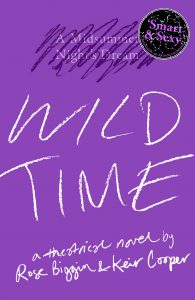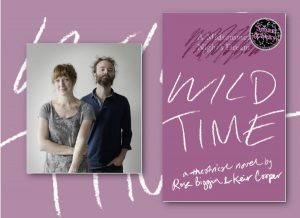Author Spotlight – Rose Biggin and Keir Cooper (WILD TIME)
Rose Biggin and Keir Cooper are writers and artists living in London. Rose’s short fiction has been published by Jurassic London, Abaddon Books & Egaeus Press, and made the recommended reading list for Best of British Fantasy 2019 (NewCon Press). Keir’s work in theatre includes a punk adaptation of Don Quijote, and Republica: queer flamenco-theatre on the Spanish Revolution. Their first novel WILD TIME (Surface Press) is an irreverent reimagining of A Midsummer Night’s Dream.
Welcome to the Hive, Rose and Keir. Let’s start small: tell us about a great book you’ve read recently!
R: We’ve both plumped for great non-fictions here. Take it away Keir!
K: Sure. I was given The Order of Time by Carlo Rovelli for a birthday and got round to reading it in lockdown – a popular-read journey into his life’s work on the essence of time, and thoroughly enjoyed having core perceptions wildly adjusted every few pages, a bit like being on a consciousness wurlitzer.
R: I’ve been reading Helen of Troy: From Homer to Hollywood by Laurie Maguire, a fascinating literary biography exploring how this mythic character has been represented from ancient Greece to now — every epoch has something to say about/to/of/for her, across all art forms. I love books like this, that track a single idea across the length of history.
Okay, time to escalate things: reality warps and you suddenly find yourself leading a D&D-style party through a monster-infested dungeon. What character class are you, and what’s your weapon of choice?
K: I’d be more labourer than aristocracy, perhaps a stable boy. And my weapon would be my wiles. (And maybe throwing horse-shoes like greek discus)
R: I was taking my own dance pole to a dance rehearsal once — it’s an old one that doesn’t come apart anymore, so it stands at nearly 3 meters high. So I was carrying this thing, and thinking it would make a great Final Fantasy-style massive weapon you could run with, plant in the ground like a long-jumper, climb it, spin around and high kick your enemies. I’ll be a kind of high priestess with a shiny silver holy relic that doubles as a close combat circus weapon.
I certainly don’t think they’d see that coming!
When you’re not trawling through dungeons, how do you like to work? (For example, in silence, with music, or serenaded by the damned souls of a thousand dead shrimps? Do you prefer to type or to hand-write? Intense planner or is your system more organic?) Tell us a little bit about your writing method!
This is an interesting one because there’s two of us. Roughly, first we work out the story and what we want the worldview to achieve, and then it’s about passing drafts back and forth until we’re both happy. Refining anything macro that comes up along the way. That process begins quite fast and ends with nitpicking at individual words. Needless to say, the shape and meanings shift as we work over time and the final thing is found rather than fully understood to begin with.
Sounds like an interesting and trusting process!
What (or who) are your most significant fantasy influences? Are there any creators whom you dream of working with someday?
R: A top three who spring to mind for me now are Terry Pratchett, Angela Carter, Catherynne M. Valente: these are all writers who care deeply about what language can do, and take story tropes to turn them to their advantage. In lockdown I’ve been enjoying getting lost in some big romantic fantasy worlds again, such as Ombria in Shadow by Patricia McKillip and Ellen Kushner’s Swordspoint; that’s a tone I enjoy a lot. Who else… Sarah Hall, Eley Williams and Helen Oyeyemi, I think they are all wonderful writers. I also enjoy contemporary SF minds like Claire North, Nina Allan and Adam Roberts: books with intelligence, rigour and wit that bend your brain a bit.
K: That’s a pretty great list from Rose. Let’s add one or two… Tenth of December by George Saunders, Cat’s Cradle by Kurt Vonnegut, and other witty authors such as Miranda July & Joshua Ferris. I also love the following because of their use of the fantastical inside the ordinary — Being John Malkovich, Holy Motors, I Heart Huckabees.
What was the last thing you watched on TV and why did you choose to watch it? Alternatively, what games have you enjoyed recently?
We watched the whole of The Good Place recently — we loved its particular wit, and of course you grow so fond of the characters over so many Bearimys. It’s a great example of comedy exploring high stakes and big ideas.
We also loved Hollywood recently, which functions as fantasy in the sense that it shows you a history that never was, so the political work is done in the gap between the fictional then and what we know of the real then, which then, inevitably, shows the gap for then and the very real now.
Games-wise, during lockdown we did a lot of important bonding with our housemates over a gnarly thousand piece jigsaw of Pendennis Castle that took far too long.
The world shifts, and you find yourself with an extra day on your hands during which you’re not allowed to write. How do you choose to spend the day?
With a cold beer on some lawn.
 Can you tell us a little something about your current work(s) in progress?
Can you tell us a little something about your current work(s) in progress?
R: I’m working on my next novel, a decadent tale of ambition and poison in belle epoque Paris. I’m also (very slowly) building up a short story collection.
K: There’s a little noise about planning a third Spanish performance piece. I work with a flamenco dancer and another theatre-maker and, over the last few years, we’ve made an anarchic punk adaptation of Don Quijote and a queer performance piece looking at the Spanish Revolution. Murmurs are happening around the next one – Covid may mean we have a luxurious planning period.
My 9-piece jazz-rock bigband have recently finished a live video album (that also has Rose guesting on vocals at 6mins in). It’s called Rewires, by A Sweet Niche – you’ll find it on YouTube. It’s not upcoming, it’s just gone, but we spent ages on it so why not plug it.
Absolutely!
What’s the most (and/or least) helpful piece of writing advice you’ve ever received?
R: Get to the end, that’s good and oft-given advice. Better to have a bad draft than the abandoned first chapters of an idea with potential.
Some less helpful advice I’ve heard is “don’t write in the present tense”. It’s an artistic choice and the present tense rules.
K: Precision and clarity are helpful. Mostly, I tend to defer to Rose on matters of writing technique as she has the most experience. As practically every word carries some weight and sends meaning off in a particular direction, it’s good to be rigorous with them.
Each project ends up with a certain form and it’s good to be alive to the opportunities a particular book presents. An artistic idea can really look like itself (kinda be tight I suppose) if you’re watching out for what each idea uniquely offers up.
Every writer encounters stumbling blocks, be it a difficult chapter, challenging subject matter or just starting a new project. How do you motivate yourself on days when you don’t want to write?
Start slow. Enjoy the domestic bits and surround yourself with enough other fun. Set shorter goals. Take regular walks if you can or get outside. A big help is to juggle multiple projects at once, then the work becomes one thing you’re doing, not your whole life. This distance is so healthy and can be a good trick for taking pressure off, and calmly coming to solutions.
If you could visit any country at any point in history, where/when would you go, and why?
R: Since we’ve been working closely with A Midsummer Night’s Dream lately I’d quite like to go to the world premiere. I’ve also got a few questions for Aphra Behn so maybe I could visit the Restoration as well. She was a master spy when she wasn’t the leading playwright of her time so this is assuming I could actually find her.
K: I’m off to the golden age of the French Riviera to hang out in the sea and crash some parties. Would also love to watch early humans painting bison on French caves and playing vulture-bone flutes, if I can quickly slide back 30,000 years while i’m in the vicinity.
R: Sounds great, I’ll come join after.
Tell us about a book that’s excellent, but underappreciated or obscure.
R: I’m not sure how obscure it is but I like to recommend Connie Willis’s To Say Nothing Of The Dog as masterfully intelligent time-travel sf, that’s a superb riff on Victorian literature and culture, as well as being a wonderful work of comic writing: “the bishop’s bird-stump” is just a delightful phrase that gets funnier each time it appears.
K: Francis Plug: How To Be A Public Author by Paul Ewan. This is the most we’ve laughed out loud at a book for a long time and one of our to-go recommends for everyone — and fantasy readers will love it too. The main character lives in an interior world of his own making, and draws us in to his unique approach to life. Francis Plug is an aspiring novelist who decides to learn his trade, and help out his loyal reader, by visiting every Booker Prize winner to glean wisdom and nab their autograph at signings. All the writers actually appear in the book, as themselves; I believe Ewan genuinely visited many of them in character as Plug. So the line between real and fictional is hilariously porous and inherits and twists directly from Cervantes.
Finally, would you be so kind as to dazzle us with an elevator pitch? Why should readers check out your work?
Our first novel WILD TIME is a riff on A Midsummer Night’s Dream, for the lovers and the haters. It’s a dance with Shakespeare to the Rocky Horror Picture Show soundtrack.
It’s like a buffet of exciting stimulus, tied up with comedy, history, fantasy, cultural and social commentary worn lightly but brightly, we’ve got Ancient Athens, Greek Gods, Sex Gods, a horde of rampaging Amazons, we get the actual fabric of the universe having very human adventures on an astronomical scale. The book will be great for anyone with a love for theatre and the pursuits of stage performance from classics to contemporary cabaret & live art, as we bring in lots of things from these worlds to shape our story.
Our work wants to leave the reader smiling, with a feast of ideas to think about. It’s fun, it’s body and sex-positive, a little bit punk and anti-authority & anti-patriarchy, it’s full of fairies and gods and Changelings and ancient heroes, it’s pro queering the canon, and did we mention the horde of rampaging Amazons?
Thank you so much Rose and Keir, and good luck with the release!
WILD TIME is out right now and available now through Bandcamp

